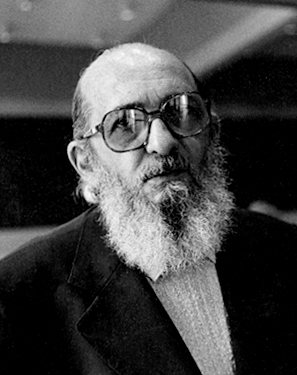Paulo Freire: Education as Reciprocal Giving

Credit: Slobodan Dimitrov via Wikimedia Commons
Licence: CC BY-SA 3.0
| Giver: | Individual |
|---|---|
| Receiver: | Formal/Structured unregistered organizations, Individual or unstructured/informal group |
| Gift: | Other |
| Approach: | Other |
| Issues: | 10. Reduced Inequalities, 16. Peace, Justice and Strong Institutions, 4. Quality Education |
Paulo Freire (1921-1997) was a Brazilian educator, administrator, theorist, author and activist. In his landmark work, Pedagogia do Oprimido (Pedagogy of the Oppressed; originally published in Spanish in 1968), Freire asserts that traditional pedagogical models – based on rote learning and a hierarchical relationship between teacher and student – mimic and perpetuate the oppressive political systems out of which they originated. To overcome this dehumanizing legacy of colonial rule, Freire argues, formerly colonized populations must engage in conscientização, a process of becoming aware of the authoritarian social and cultural forces that have shaped their mentality and behavior.
To cultivate conscientização in the classroom setting, Freire proposes an innovative teaching model based on an equal, collaborative exchange between instructor and student. Rooted in principles of cooperation, solidarity and reciprocity, Freire’s radical methods aimed to foster a spirit of pluralism and tolerance in the learning experience, while encouraging students to liberate themselves from the repressive influence of their colonial past.
Overcame Early Hardship
Paulo Freire was born into a working class family in Recife, Brazil, in 1921. His father died when Freire was in his early teens, forcing him to drop out of school to support his family. Through the generous intervention of his high school principal, Freire was able to resume his education, teaching Portuguese language classes to help defray his tuition costs.
Freire eventually enrolled at the University of Recife, where he studied law and philosophy. Important influences included the writings of Georg Wilhelm Friedrich Hegel (1770-1831) and Karl Marx (1818-1883), as well as the work of Anísio Teixeira (1900-1971), a Brazilian educator and reformer whose pioneering advocacy on behalf of universal education significantly shaped Freire’s pedagogical ideals.
In 1947 Freire began working for the Serviço Social da Indústria (SESI), a government agency dedicated to providing health, education and other services for working class Brazilians. Freire later joined the Division of Research and Planning, where he conducted studies on adult education, an experience that inspired his concept of socially-engaged learning models.
Conceived of a New Teacher-Student Relationship
While teaching literacy classes during the early 1960s, Freire began to experiment with his notion of the classroom as a “cultural circle” wherein teacher and students engage in a dialogue, opening up avenues for mutual learning and understanding. Rather than representing an authority figure, the teacher assumes the role of coordinator, while students actively drive the discussion.
In his subsequent writings, Freire presents the cultural circle as an alternative to the traditional “banking model” of education – in which the student is treated like a “vault” that receives information uncritically, without questioning its veracity, relevance or value. For Freire, this top-down approach was an inheritance of the colonial era, when the ruling Portuguese regime imposed its cultural values onto the Brazilian population.
Freire taught these techniques at the University of Recife until 1964. As part of his vision of educational reform, he hoped to establish 20,000 cultural circles throughout Brazil, with the aim of teaching five million adults how to read within two years. His ambitions were abruptly cut short, however, when a military coup overthrew the progressive government of President João Goulart (1919-1976). After a brief stint in prison – where he began writing his first book, Educação como Practica da Liberdade (Education as the Practice of Freedom; 1967) – Freire fled to Chile, where he organized literacy classes for farmers.
Achieved International Acclaim
Freire’s experiences engaging with Chilean farmers provided the basis for Pedagogy of the Oppressed. Written in Portuguese but first published in Spanish, the work appeared during a period of intense social justice activism across the world, and quickly resonated with groups agitating for civil rights, gender equality and other causes. In its embrace of grassroots liberation struggles, the work echoed the thought of political philosopher Frantz Fanon (1925-1961), in particular the idea that oppressed populations must play a direct role in winning their own freedom. Soon after its initial publication, Pedagogy of the Oppressed appeared in English, French and other translations, before being released in a Portuguese edition in 1972.
After spending a decade in Switzerland, Freire returned to Brazil in 1980, where he became active with the newly-formed Partido dos Trabalhadores (Workers’ Party). He served for two years as Secretary of Education for the state of São Paulo and held teaching positions at the University of Recife, continuing to write and publish until his death in 1997.
Freire’s ideas have continued to shape education policy in post-colonial governments across the world. Democratic, nonhierarchical and egalitarian, Freire’s concept of pedagogy as a reciprocal exchange between instructor and pupil – a relationship founded on dignity and mutual respect – points to a model of generosity that opens fresh paths for all individuals to experience self-realization, empowerment and liberation.
Contributor: Stephen Meyer
| Source type | Full citation | Link (DOI or URL) |
|---|---|---|
| Publication |
Bartlett, Lesley. “Dialogue, Knowledge, and Teacher‐Student Relations: Freirean Pedagogy in Theory and Practice.” Comparative Education Review 49, no. 3 (August 2005): 344-64. |
https://www.jstor.org/stable/10.1086/430261 |
| Publication |
Berthoff, Ann E. “Paulo Freire’s Liberation Pedagogy.” Language Arts 67, no. 4 (April 1990): 362-69. |
https://www.jstor.org/stable/41961745 |
| Publication |
Giroux, Henry A. “Paulo Freire and the Politics of Postcolonialism.” Journal of Advanced Composition 12, no. 1 (Winter 1992): 15-26. |
https://www.jstor.org/stable/20865825 |
| Book |
Kohan, Walter Omar. Paulo Freire: A Philosophical Biography. Translated by Jason Wozniak and Samuel D. Rocha. London: Bloomsbury Academic, 2021. |
9781350195998 |
| Publication |
Roberts, Peter. “Knowledge, Dialogue, and Humanization: The Moral Philosophy of Paulo Freire.” Journal of Educational Thought (JET)/Revue de la Pensée Éducative 32, no. 2 (August 1998): 95-117. |
https://www.jstor.org/stable/23767458 |